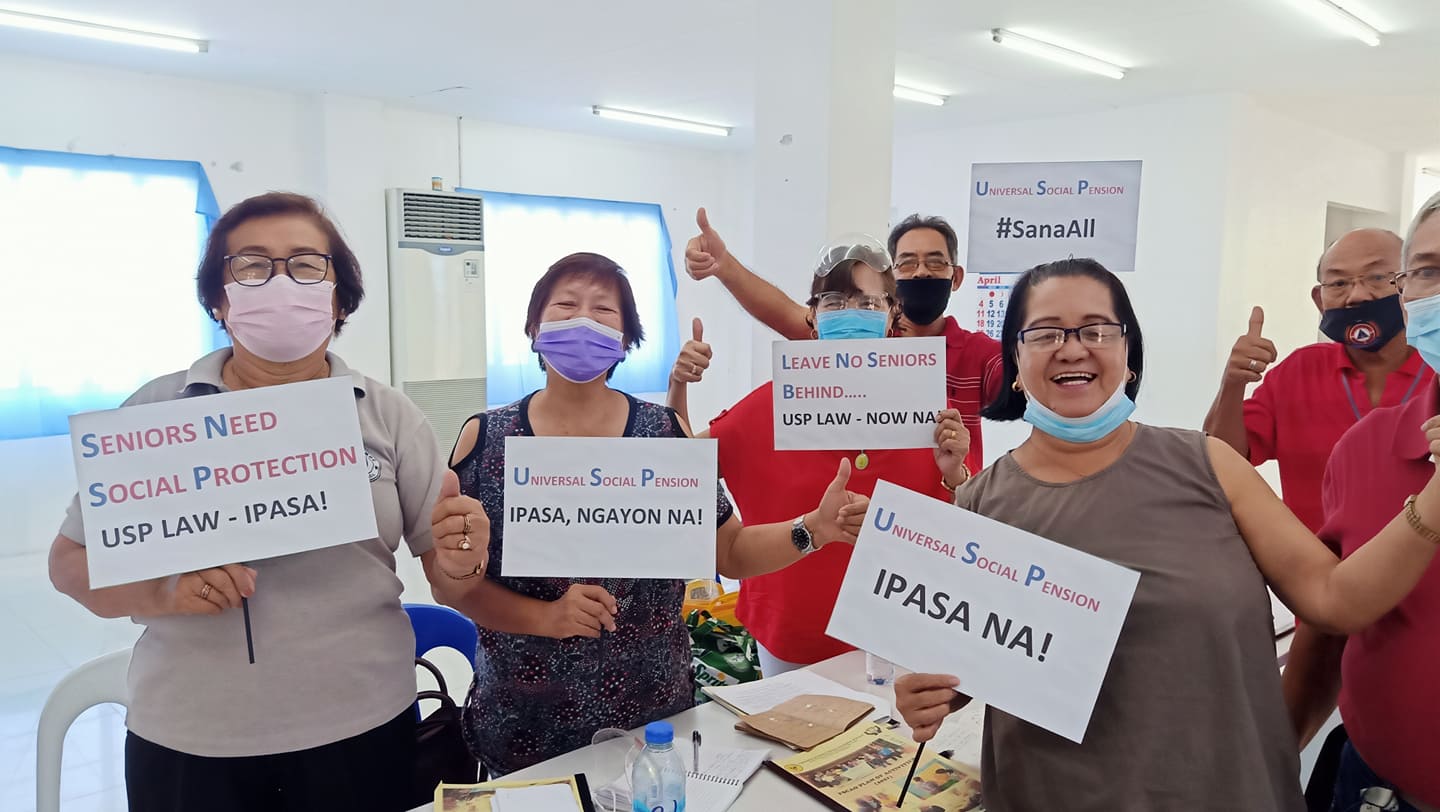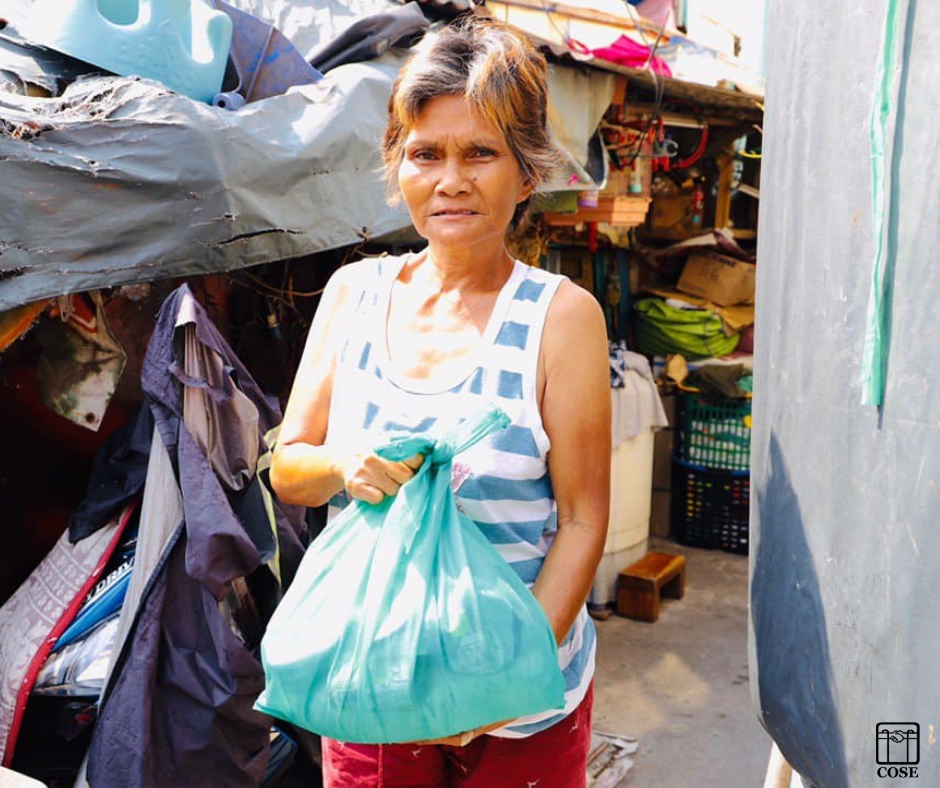The Coalition of Services of the Elderly, Inc. (COSE) is a non-governmental organization dedicated to working with older adults in the Philippines. Since 1989 COSE has sought to form and strengthen organizations aimed at helping older adults through building partnerships and advocacy. COSE considers older women and men as partners in the development of a better society for all ages — one where everyone can live with dignity and security. To learn more about this organization’s work, AARP International spoke with COSE Executive Director Emily Beridico.
AARP What challenges do older people face in the Philippines? How does your organization address those challenges?
Emily Beridico There are a number of challenges faced by older people in the Philippines, but the priorities are economic and health concerns. The situation was aggravated by the COVID-19 pandemic, as older people are particularly affected by the disease.
In 2018, 16.7 percent of the total Filipino population lived below the national poverty line,1and almost a quarter of those individuals were older adults.2 Even before the COVID-19 pandemic, food insecurity was common. In a 2018 survey, 13 percent of older people’s households experienced hunger in the preceding 3 months.3
More than in other countries in the region, older Filipinos rely on work to survive.4 In 2016, 45 percent of older Filipinos worked outside the home to maintain their main source of income. Another 30 percent relied on their children’s income, and only 20 percent relied primarily on a pension.5 Indeed, almost half of older Filipinos — 57 percent of older men and 39 percent of older women — continue to be economically productive, while 28 percent of those aged 70–79 work to earn an income.6
Many older persons are active in the informal economy, with over 70 percent of those who are economically active relying on these jobs, according to the 2012 Labour Force Survey.7 This workforce, which is dominated by women, is likely to be poorer than formally employed counterparts. They also work in sectors heavily affected by the pandemic (such as hospitality and tourism) and were therefore excluded from crisis-related short-term financial assistance programs for businesses. The International Labour Organisation predicts poverty amongst such informal workers will skyrocket everywhere.8
More than a third of older adults do not enjoy any form of pension in the Philippines.9 In contrast, China, Thailand, Mongolia, Brunei, Timor-Leste, Vietnam, and Myanmar all guarantee basic income security in older age through universal social pensions.10 As a result, Filipinos, who worked most of their lives in the informal sector, age with very few savings and assets to draw from.
These challenges are being addressed by COSE through policy advocacy such as a campaign on the passage of a universal social pension; efforts to form and strengthen older persons’ organizations; and the promotion and establishment of community-based programs benefiting older persons.
AARP How does your organization amplify the effects of any policies, laws or community practices that are already making a difference in the lives of older people?
 EB COSE and our partner organizations advocate for enhancements of current policies/programs, like the social pension program. We proposed a yearly increase in the budget allocation and the number of beneficiaries. Since 2015, we have pushed for universal pension coverage for individuals age 60 and above and for doubling the amount distributed from Php500.00/month ($10) to Php1,000.00 ($20). Unfortunately, as of November 2021, the change has not yet been approved.
EB COSE and our partner organizations advocate for enhancements of current policies/programs, like the social pension program. We proposed a yearly increase in the budget allocation and the number of beneficiaries. Since 2015, we have pushed for universal pension coverage for individuals age 60 and above and for doubling the amount distributed from Php500.00/month ($10) to Php1,000.00 ($20). Unfortunately, as of November 2021, the change has not yet been approved.
As a result of COSE’s advocacy, there has been a significant increase in the number of individuals who benefit from existing programs. There were 139,000 beneficiaries in 2011 when the program started, and by 2021, that number had increased to 3.7 million beneficiaries.
Aside from the social pension program, we also lobby to enhance the benefits package of the PhilHealth program for older people.
On a smaller scale, COSE works to strengthen other organizations supporting older adults and promote the establishment of community-based programs, such as homecare assistance and mobile health care services, to address their health needs. These are necessary because of both the lack of health care systems and the inaccessibility of the few health services that are in place.
AARP How has your work been affected by the COVID-19 pandemic?
EB The COVID-19 pandemic greatly affects the work of COSE due to mobility restrictions. Face-to-face gatherings are prohibited all over the country. Even in the municipalities that allow some meetings, the number of participants must be reduced, and activities must be conducted in two sittings instead of one.
This also limits the lobbying activities of COSE and our partner organizations. Although mass mobilization and face-to-face meetings with legislators are not allowed, we continue our efforts through virtual meetings.
 AARP How do you motivate volunteers to work for your organization? On the other hand, how does your organization develop a relationship with the communities and individuals that could benefit from your assistance? What is your biggest challenge with outreach?
AARP How do you motivate volunteers to work for your organization? On the other hand, how does your organization develop a relationship with the communities and individuals that could benefit from your assistance? What is your biggest challenge with outreach?
EB We are amazed by how volunteers, particularly older volunteers, are motivated to support our organization. It may be, in part, because they are also directly affected by a lack of protection for older persons. Volunteers are motivated when they see the positive impact of their work in local communities, especially if they are able to help the most vulnerable.
Developing a relationship with communities and individuals has not been a challenge so far for COSE. We have community development officers or community mobilizers for each of our project areas. One of our strategies is to lead community organizing efforts in a way that substantively involves community members, particularly older persons, in all project processes, including planning, implementation, monitoring, and evaluation. We also build partnerships with local government officials during project implementation to ensure that the projects are supported by local policies.
Outreach is not challenging for COSE, or our partner organizations, because even local government officials request our presence in their localities for implementing projects that respond to older persons’ needs. It only becomes a challenge if the request for COSE presence and projects is not supported by adequate financial and human resources.
AARP Which of your organization’s projects have been most successful? How does your organization define success? What challenges did you face during project implementation?
EB Some of COSE’s successful projects are community-based programs that respond directly to the socioeconomic and health needs of older persons. These include our homecare assistance program, mobile health care services, and our community-based residential care facility.
For COSE, success is evident if projects and programs are financially sustainable; if a large number of older persons benefit from our work; if new policies are adopted by the national agencies or local government units; and if our projects/programs are replicated by local government units or other organizations.
AARP Why do you think there is a disconnect between public rhetoric about respect for older women and men and the way that many older individuals face daily challenges to their wellbeing?
EB I believe that respect for older persons is highly valued in the Philippines, because close family ties are particularly protected here.
Nevertheless, there remain cases of elder abuse where perpetrators are family members, and older persons still face daily challenges in life. For me, this is partially a result of poverty. Children taking care of older persons still need to work to earn a living. They are stressed and experience boredom which can lead them to commit abuse. Cases of elder abuse also increased during the pandemic as children supporting older persons lost their jobs and faced additional struggles. This abuse is also related to how government officials respond to the challenges faced by the older persons, how they prioritize resources, and how they allocate funds for the programs protecting the rights of older persons.
AARP How does your organization distinguish between working with and working for older persons? Why is this differentiation so important?
EB We believe working for older persons is a one-sided approach where there is less participation of the older persons. Projects and activities are generally implemented without proper consultation with local communities. Most of the time, this way of working cannot be sustained. Despite this perspective, I do agree the working for approach could be used in some contexts, depending on the capacity of the people being affected by a particular project. For example, older persons who are frail, sick, and bedridden cannot fully participate in project design and will primarily be a beneficiary of our programs and services.
This differentiation is very important to understand in order to determine which approach should be used from the very start of an intervention.
——————
1 https://www.adb.org/countries/philippines/poverty#
2 https://www.jstor.org/stable/43486391
3 https://www.eria.org/uploads/media/Books/2019-Dec-Ageing-and-Health-Philippines/09-Ageing-and-Health-Philippines-Chapter-3.pdf
4 https://www.ilo.org/secsoc/information-resources/publications-and-tools/policy-papers/WCMS_645692/lang--en/index.htm
5 https://www.helpage.org/what-we-do/social-protection/work-family-and-social-protection-in-asia/
6 https://www.eria.org/uploads/media/Books/2019-Dec-Ageing-and-Health-Philippines/09-Ageing-and-Health-Philippines-Chapter-3.pdf
7 https://www.helpage.org/what-we-do/social-protection/work-family-and-social-protection-in-asia/
8 https://www.worldpoliticsreview.com/articles/28911/informal-workers-are-bearing-the-brunt-of-the-coronavirus-economic-impact
9 https://www.onenews.ph/effective-pension-scheme-for-phl-senior-citizens-sought
10 https://www.philstar.com/headlines/2017/12/01/1764515/4-10-filipino-elderly-without-pension-ilo
For more information, visit: https://cose.org.ph/